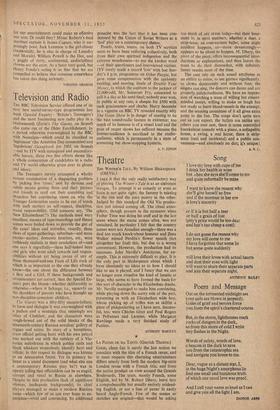Television and Radio
Ina BBC Television Service' offered one of its very best social-survey-type programmes last week (Special Enquiry : 'Britain's Teenagers') and the most fascinating new radio play in a twelvemonth (Zorin's The Guests, on Sound) also came out of the Older Establishment. In a period otherwise overweighted by the BBC with Nostalgia—which could be classified as 'legitimate' (the Armistice Day ceremonies) and 'lugubrious' (Scrapbook for 1905, on Sound) --and by ITV with uninspired and uncomfort- able lunacy, these two fine efforts shone like a whole consecution of candelabra in a radio and TV world otherwise given over to gloom and idiocy.
The Teenagers survey attempted a wholly serious examination of a disquieting problem by picking five 'cases,' and by devious and subtle means getting them and their parents and friends to spell out their stumbling and shapeless but convincing views on why the Younger Generation seems to be out of touch with such matters as self-respect, discipline, social responsibility. (Did someone say, 'The New Elizabethans'?) The methods used were excellent, masses of tape-recordings and filmed scenes were boiled down to provide the gist of the cases' ideas and' attitudes; visually, these shots of street-gatherings, suburban—and more exotic—parties; domestic. interiors, etc., were ruthlessly realistic in their revelations of—and one says it regretfully—these half-baked boys and girls who want adult rewards and respon- sibilities without yet being aware of any of those thousand-and-one Facts of Life each of which is as important as the one they afteady know—the one about the difference between a Boy and- a Girl. If these backgrounds and
, circumstances are correct, then the Special En- quiry puts the blame—whether deliberately or otherwise—where it belongs; i.e., squarely on he shoulders of parents who have brought up nun-discipline-conscious children.
The Guests was a fifty-fifty success-failure; in form and dialogue it was overweighted with it pathos and a nostalgia that seemingly arc relics of Chekhov, and the characters were rough-hewed out of the solid blocks of the nineteenth-century Russian novelists' gallery of rogues and saints. Its story of a bumptious, crass official getting hoist with his own petard was worked out with the subtlety of a Vic- torian melodrama in which golden curls and black whiskers respectively identify hero and villain; in this respect its dialogue was hirsute as an Amazonian forest. Yet its primary in- terest as a social document (and what else can a contemporary Russian play be?) was in Openly telling that officialdom can be as stupid, corrupt and venal in Russia as elsewhere. Despite its thin production (lack of significant silences, inadequafe backgrounds), its chief Players managed to make a modern Russian scene--which few of us can ever hope to ex- perience—vivid and convincing, Its additional panache was the fact that it has been con- demned by the Union of Soviet Writers as a tad' play on a contemporary theme.
Panels, trusts, teams, on both TV services seem to have been suffering collectively, both from their own spiritual indigestion and the extreme woodenness—to use the kindest word —of their questioners and interviewed victims. ' ITV surely made a record 'low' with last Sun- day's 4 p.m. programme on Other People, but gave some compensation with the curiously exciting, and moving, finale of Double Your Money, in which the aspirant to the jackpot of £1,000-odd, Mr. Somerset Fry, consented to call it a day at his semi-final; nobody ever won, in public at any rate, a cheque for £500 with such graciousness and chaftn. Harry Secombe in a vignette on BBC TV revealed exactly why The Goon Show is in danger of ceasing to be the best sound-radio feature in existence; too much of its humour is of a visual kind and the pace of recent shows has suffered because the listener-audience is sacrificed to the studio- audience, which is permanently in a state of screaming but show-stopping hysteria.
A. V. COTON


































 Previous page
Previous page